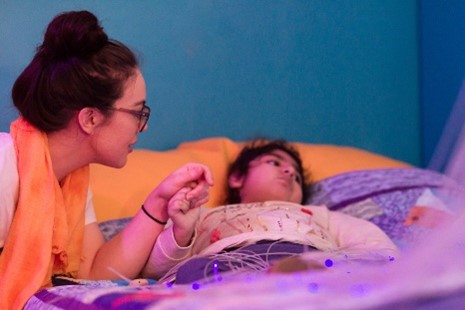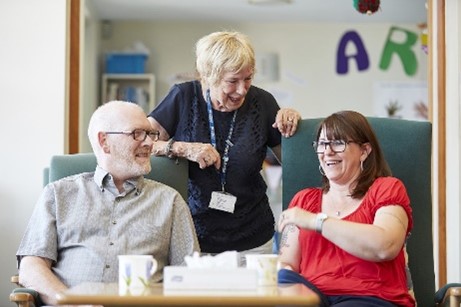Hello, my name is Rob
Here in West Yorkshire, we want everyone to have the best start in life, to be supported to live well and to die in the place of their choosing, surrounded by the people who matter to them. This idea of a good death that does honour to a whole life is something we should aspire to ensure every person can experience. Talking about death, whilst sometimes a taboo, is an important aspect of healthcare that is often misunderstood or overlooked.
I have visited most of the hospices in West Yorkshire over the years and accompanied palliative care teams visiting people at the end of life in our communities. At their best, these experiences have been characterised by a calmness, serenity, and some sense of relief for people and their families. They are staffed by people who are kind, compassionate and caring in a way that is ideally suited to end-of-life care. They know there will be no second chances to get this right and so do all they can to ensure people get what they need. The fact that this is the area I have received most compliments about in my career, suggests they succeed on a regular basis.
At West Yorkshire Health and Care Partnership we are ambitious for the palliative and end of life care people can expect. The West Yorkshire Hospice Collaborative is a key partner in our new Integrated Care Board (ICB), strengthening networks of care and support to people living across West Yorkshire. The Collaborative has 10 hospices in total, with Eight hospices for adults and two children’s hospices providing expertise, influence, and experience to improve palliative and end of life care.
Our hospices support thousands of people during some of the most acute and critical times a person can experience. We are really proud of the provision and expertise in our area - whilst not everyone is comfortable learning about hospice care , we want to share the innovative, caring and tailored practices these hospices are providing so people have full control and choice when it is needed.
 We are guided by the Ambitions Framework, a national set of aims including:
We are guided by the Ambitions Framework, a national set of aims including:
Ambition 1 – Each person is seen as an individual
Ambition 2 – Each person gets fair access to care
Ambition 3 – Maximising comfort and wellbeing
Ambition 4 – Care is co-ordinated
Ambition 5 – All staff are prepared to care
Ambition 6 – Each community is prepared to help.
In West Yorkshire, we have taken it one step further. We are absolutely committed to developing a vision of palliative and end of life care to enable people to die in a place of their choice, with people important to them and their end of life wishes in place.
This vision can only be delivered by collaborating through our heath, social care, voluntary community social enterprise sector (VCSE) and lived experience partners and by assessing the support we provide in relation to the national Ambitions Framework.
Hospice services are open to everyone and are free, inclusive, non-denominational and holistic. Our hospices are charities. They generate most of the income they spend on services. Volunteers are integral to support their work and outreach. Their primary goal is to improve the quality of life for people with serious illnesses. They provide physical, emotional, and spiritual support to both them and their families; helping them cope with the symptoms of the illness whilst managing pain. This can help people and families feel more comfortable, relaxed, and at peace, even in the face of a life-threatening illness. They support the whole person, not just the physical symptoms of an illness. This is why it is so important to understand the diversity, psychology, social, and spiritual aspects of a person's life in palliative and end of life care.
 For families and caregivers, hospices can be a lifeline caring about the physical and emotional demands caring for someone at the end of their life can cause. They are instrumental within the healthcare system, improving treatment outcomes and resources. They provide support to the whole person, not just their illness. This holistic approach to care can help patients and their families feel more supported and less isolated during a difficult time.
For families and caregivers, hospices can be a lifeline caring about the physical and emotional demands caring for someone at the end of their life can cause. They are instrumental within the healthcare system, improving treatment outcomes and resources. They provide support to the whole person, not just their illness. This holistic approach to care can help patients and their families feel more supported and less isolated during a difficult time.
Hospice services are much wider ranging than many think. Services range beyond palliative care to respite breaks, symptom control, pain and medicine management, carer support, family support, bereavement support and counselling and training. These take place in the hospice and in the wider community and in people’s homes.
One of areas that I, and the Partnership through our hospices, feels strongly about is diversity – and all the challenges, changes and opportunities this brings. Last year I visited Manorlands Hospice with our programme manager Charlotte Goulding. I saw first-hand that if we start with people and listen, learn, understand – we can create services that reflect our communities.
I know we have great expertise in West Yorkshire and we have some pioneering work in progress. I am proud that the hospices collectively are helping to drive the changes we want to see in end of life care.
Death, grief and loss are universal. However, the sharpness of that experience is tempered by supportive and tailored care. We want people to be comfortable and at peace. We want families and loved ones to find closure and healing in happy memories. We want our region to be known for its approach to palliative and end of life care and we want to start the conversation to ensure people’s wishes are at the centre of their treatment and this is compassionate, informed, kind, local and personal.
Finally, I would like to thank all our palliative care teams across West Yorkshire. The last three years have seen exceptional numbers of deaths in exceptional circumstance. During this time, you have been magnificent. Thank you.
Here’s to a good death, available to us all.
Rob

